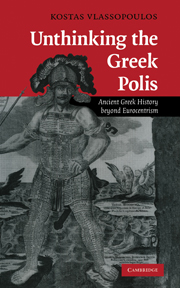PART III - BEYOND THE POLIS: THE POLIS AS PART OF A SYSTÈME-MONDE
Published online by Cambridge University Press: 22 September 2009
Summary
Until now this work has pursued three goals. The first was to show how the dominant approach to the study of Greek history emerged, how the polis emerged as the key organising principle, what other alternative approaches have been sidelined and how wider discursive issues fundamentally shaped the course of scholarship on Greek history. Following this, I attempted to look back at how ancient Greeks discoursed about their poleis, paying particular attention to the various Aristotelian conceptualisations of the polis, and arguing that their analytical value is still relevant for modern historians. Finally, I have presented a critique of the current orthodoxy on the study of Greek polis: an orthodoxy that views the Greek polis as a unitary and solitary entity, to be juxtaposed to other similar entities. I pursued this critique in two case studies: the opposition of Greek polis to Oriental despotism; and the opposition of the Greek polis as consumer city versus the medieval/early modern European producer city.
The question has probably long arrived at the reader's mind: if the criticism has been successful, what is there to substitute those approaches criticised? How can we write Greek history from an alternative approach? How can Greek history be integrated with the history of the Near East and the wider Mediterranean? It is indeed legitimate to expect a positive example of what such a history would look like. But the reader, who expects to find in the following pages an alternative narrative of Greek history, will be utterly disappointed.
- Type
- Chapter
- Information
- Unthinking the Greek PolisAncient Greek History beyond Eurocentrism, pp. 143 - 146Publisher: Cambridge University PressPrint publication year: 2007



